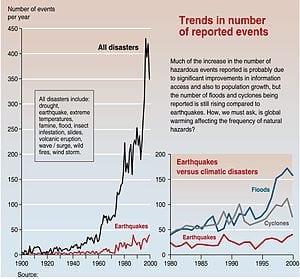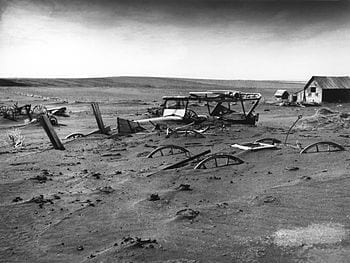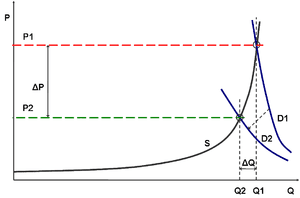Further delay in the implementation of comprehensive international climate policies could substantially increase the short-term costs of climate change mitigation.
Global economic growth would be cut back by up to 7 percent within the first decade after climate policy implementation if the current international stalemate is continued until 2030 – compared to 2 percent if a climate agreement is reached by 2015 already, a study to be published next tuesday by scientists of the Potsdam Institute for Climate Impact Research (PIK) shows. Higher costs would in turn increase the threshold for decision-makers to start the transition to a low-carbon economy. Thus, to keep climate targets within reach it seems to be most relevant to not further postpone mitigation, the researchers conclude.
“The transitional economic repercussions that would result if the switch towards a climate-friendly economy is delayed, are comparable to the costs of the financial crisis the world just experienced,” lead-author Gunnar Luderer says. The later climate policy implementation starts, the faster – hence the more expensive – emissions have to be reduced if states world-wide want to achieve the internationally agreed target of limiting global warming to 2 degrees above pre-industrial levels. A binding global agreement to implement the emissions reductions required to reach this target is currently still under negotiation, while global emissions have continued to rise.
“For the first time, our study quantifies the short-term costs of tiptoeing when confronted with the climate challenge,” Luderer says. “Economists tend to look at how things balance out in the long-term, but decision-makers understandably worry about additional burdens for the people and businesses they are responsible for right now. So increased short-term costs due to delaying climate policy might deter decision-makers from starting the transformation. The initial costs of climate policies thus can be more relevant than the total costs.”
Future energy price increases could be limited
The researchers investigated a number of cost dimensions, including climate policy effects on energy prices. If emissions reductions are delayed beyond 2030, global energy price levels are likely to increase by 80 percent in the short term. Such price increases are of particular concern because of the burden they put on the world’s poor. In the past, comparable energy price increases in developing countries have resulted in massive public opposition and social unrest, like in Indonesia in 1998 after a cutback of fuel subsidies. If an agreement on emissions reductions compatible with the 2 degree target is reached until 2015, short-term energy price increases could be limited to 25 percent.
The Latest Bing News on:
Climate policy
- Appeals court rejects climate change lawsuit by young Oregon activists against US governmenton May 1, 2024 at 9:17 pm
A federal appeals court panel on Wednesday rejected a long-running lawsuit brought by young Oregon-based climate activists who argued that the U.S. government’s role in climate change violated their ...
- 18 apply to be senior policy climate adviser, three names submitted to governoron May 1, 2024 at 8:35 pm
With no opponent in the Democratic primary in June and no Republican challenger in the November general election, state Rep. Kristina Ortez of Taos is all but guaranteed a third term in the New Mexico ...
- Raskin calls Republican senator ‘climate fatalist’on May 1, 2024 at 6:58 pm
Welcome to The Hill’s Energy & Environment newsletter{beacon} Energy & Environment Energy & Environment The Big Story Raskin calls Republican senator ‘climate ...
- Gas Prices Are Putting Washington’s Boldest Climate Policy at Riskon April 30, 2024 at 11:01 pm
Deep-blue Washington and its outgoing Governor Jay Inslee, who put climate at the top of his agenda, have sought to lead the US in carbon-cutting commitment. But the backlash to his signature policy ...
- Don’t cut the green crap: Why reversing climate policies is a mistakeon April 30, 2024 at 10:00 pm
Labour and the Tories should not be turning their backs on the green transition - one of the UK's big success stories - at a time when taking action is more important than ever, Jessica Frank-Keyes ar ...
- How climate policies can drive voters to the far righton April 30, 2024 at 5:00 pm
The shift also shows how, as climate policies increasingly touch citizens’ lives, even countries whose voters are staunchly supportive of clean energy may hit roadblocks. “This has really expanded the ...
- How climate policies are becoming focus for far-right attacks in Germanyon April 30, 2024 at 5:21 am
Politicians fear perceived costs of green transition are driving poor and rural voters to parties such as AfD ...
- The Uncomfortable Truth About the UK’s Climate Policieson April 29, 2024 at 2:09 pm
Britain’s former climate adviser says the country’s future plans are weak, climate protests are no longer helpful, and working closely with Big Oil is a jarring necessity.
- How President Biden's national climate adviser Ali Zaidi steers the conversation on renewable energyon April 29, 2024 at 4:00 am
As the national climate adviser to President Joe Biden, Ali Zaidi is the administration’s point man on how to transition the nation away from oil and other fossil fuels. A 35-year-old Harvard-educated ...
- Five Major Climate Policies Trump Would Probably Reverse if Electedon April 26, 2024 at 1:03 pm
He has called for increased oil production and said that electric vehicles will result in an ‘assassination’ of jobs.
The Latest Google Headlines on:
Climate policy
[google_news title=”” keyword=”climate policy” num_posts=”10″ blurb_length=”0″ show_thumb=”left”]
The Latest Bing News on:
International climate policies
- International Law Adapts As Climate Court Cases Add Upon May 1, 2024 at 11:44 am
The landmark ruling that condemned Switzerland for climate inaction confirmed governments' obligation to reduce greenhouse gas emissions. But what a ...
- Exclusive: Citigroup sees loan book hit in climate action ramp-up, document showson May 1, 2024 at 10:29 am
Citigroup could suffer billions of dollars of losses in its loan book if the world sped up efforts to tackle climate change, according to a confidential analysis prepared by the U.S. bank that was ...
- How a Group of Swiss Women Secured a Climate Legislation Winon May 1, 2024 at 8:40 am
The women, all over 65, argued they were especially vulnerable to the impacts of climate change. An international court agreed.
- Azerbaijan, COP29 host, shows disregard for climate action and human rightson April 30, 2024 at 10:51 pm
In Berlin, president Aliyev touched on recent investigations and arrests leveled against a series of independent and opposition media adding, "these investigations were lawful. Any given country must ...
- Women should be included in decisions on the protection of human rights in the climate crisis, say researcherson April 29, 2024 at 2:30 pm
Eighty percent of climatic migrants are women and children. This figure means that a new international legal framework is required to protect human rights by adding gender-sensitive measures to ...
- The world’s most advanced economies just agreed to end coal use by 2035 – with a catchon April 29, 2024 at 9:28 am
Ministers from the Group of Seven nations — which includes the US — have agreed to shut down all their coal plants by 2035 at the latest, a UK minister said.
- Fight Climate Change With Fiscal Disciplineon April 29, 2024 at 5:00 am
But they also acknowledged an excess of unfinished work — in particular, on improving financial stability, restoring fiscal discipline and fighting climate change. Governments need to see that these ...
- The world agreed to create a climate reparations fund. Now comes the hard part.on April 29, 2024 at 1:30 am
A 26-member board is finally beginning work on the UN’s new climate reparations fund — three months late, and billions of dollars short.
- International Tribunal Set To Issue Climate Change Opinion On May 21on April 24, 2024 at 11:28 am
The International Tribunal for the Law of the Sea has announced they will deliver their advisory opinion on climate change and international law on May 21.
- Climate Policy Is Workingon April 24, 2024 at 7:50 am
KELLY SIMS GALLAGHER is Professor of Energy and Environmental Policy and Interim Dean of the Fletcher School at Tufts University. These young people despaired of attempts by their governments to ...
The Latest Google Headlines on:
International climate policies
[google_news title=”” keyword=”international climate policies” num_posts=”10″ blurb_length=”0″ show_thumb=”left”]












